SapirWhorf hypothesis 萨丕尔沃尔夫假说_跨文化交际导论
Sapir-Whorf hypothesis 萨丕尔-沃尔夫假说_跨文化交际导论
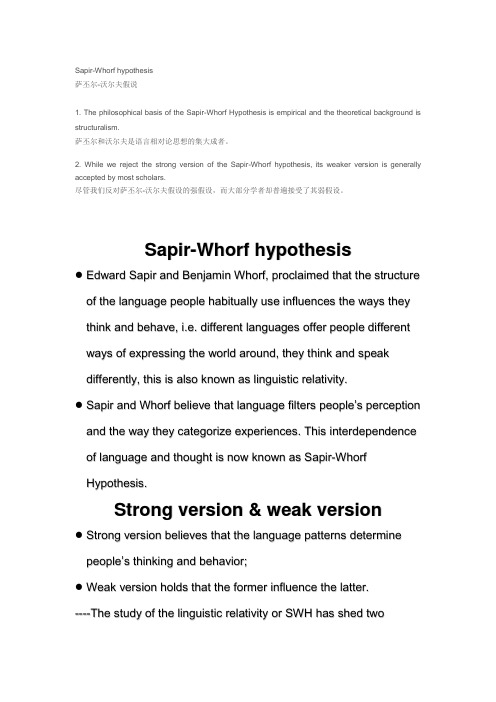
Sapir-Whorf hypothesis萨丕尔-沃尔夫假说1. The philosophical basis of the Sapir-Whorf Hypothesis is empirical and the theoretical background is structuralism.萨丕尔和沃尔夫是语言相对论思想的集大成者。
2. While we reject the strong version of the Sapir-Whorf hypothesis, its weaker version is generally accepted by most scholars.尽管我们反对萨丕尔-沃尔夫假设的强假设,而大部分学者却普遍接受了其弱假设。
S a p i r-W h o r f h y p o t h e s i s●E d w a r d S a p i r a n d B e n j a m i n W h o r f,p r o c l a i m e d t h a t t h e s t r u c t u r e o f t h e l a n g u a g e p e o p l e h a b i t u a l l y u s e i n f l u e n c e s t h e w a y s t h e yt h i n k a n d b e h a v e,i.e.d i f f e r e n t l a n g u a g e s o f f e r p e o p l e d i f f e r e n tw a y s o f e x p r e s s i n g t h e w o r l d a r o u n d,t h e y t h i n k a n d s p e a kd i f fe r e n t l y,t h i s i s a l s o k n o w n a s l i n g u i s t i c r e l a t i v i t y.●S a p i r a n d W h o r f b e l i e v e t h a t l a n g u a g e f i l t e r s p e o p l e’s p e r c e p t i o na n d t h e w a y t h e y c a t e g o r i z e e x p e r i e n c e s.T h i s i n t e r d e p e n d e n c e o f l a n g u a g e a n d t h o u g h t i s n o w k n o w n a s S a p i r-W h o r fH y p o t h e s i s.S t r o n g v e r s i o n&w e a k v e r s i o n●S t r o n g v e r s i o n b e l i e v e s t h a t t h e l a n g u a g e p a t t e r n s d e t e r m i n ep e o p l e’s t h i n k i n g a n d b e h a v i o r;●W e a k v e r s i o n h o l d s t h a t t h e f o r m e r i n f l u e n c e t h e l a t t e r.----T h e s t u d y o f t h e l i n g u i s t i c r e l a t i v i t y o r S W H h a s s h e d t w oi m p o r t a n t i n s i g h t s:●T h e r e i s n o w a d a y s a r e c o g n i t i o n t h a t l a n g u a g e,a s c o d e,r e f l e c t sc u l t u r a l p r e o c c u p a t i o n s a nd c o n s t r a i n s t he w a y p e o p l e t h i n k.●M o r e t h a n i n W h o r f’s d a y s,h o w e v e r,w e r e c o g n i z e h o wi m p o r t a n t c o n t e x t i s i n c o m p l e m e n t i n g t h e m e a n i n g s e n c o d e d i n t h e l a n g u a g e.Much was made of the Inuit language where there is no precise equivalent to the single English word "snow."Because snow is such an important part of survival of people of the north, they had nineteen different words that varied according to the condition of snow.At first, some argued that this was only a matter of what sizes and shapes of boxes are the words we use in which to put experiences.In English, however, we have no single word meaning the chemical, di-hydrogen oxide (H2O).If you want to object and say, "But we have the word 'water,'" let me point out that the word "water" does not apply to conditions of H2Owhen it is frozen, crystallized or vaporized, for which we have other words (ice, snow, steam, fog, clouds, humidity).From the time we are born, we are inundated with thousands of bits of information per second, as sound, smell, touch, temperature and sight.They are many and random. In themselves, they have no meanings.It is only through our interaction with other human beings that we begin to apply meaning, and we start to put a range of different information bits into the same categories, words.Those words, or categories of large numbers of information bits, differ from language to language.。
“萨丕尔—沃尔夫假说”视角下高中英语写作教学探究
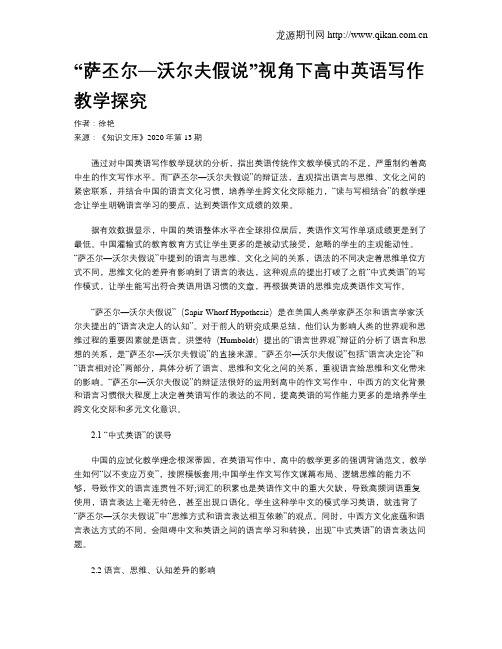
“萨丕尔—沃尔夫假说”视角下高中英语写作教学探究作者:徐艳来源:《知识文库》2020年第13期通过对中国英语写作教学现状的分析,指出英语传统作文教学模式的不足,严重制约着高中生的作文写作水平。
而“萨丕尔—沃尔夫假说”的辩证法,直观指出语言与思维、文化之间的紧密联系,并结合中国的语言文化习惯,培养学生跨文化交际能力,“读与写相结合”的教学理念让学生明确语言学习的要点,达到英语作文成绩的效果。
据有效数据显示,中国的英语整体水平在全球排位居后,英语作文写作单项成绩更是到了最低。
中国灌输式的教育教育方式让学生更多的是被动式接受,忽略的学生的主观能动性。
“萨丕尔—沃尔夫假说”中提到的语言与思维、文化之间的关系,语法的不同决定着思维单位方式不同,思维文化的差异有影响到了语言的表达,这种观点的提出打破了之前“中式英语”的写作模式,让学生能写出符合英语用语习惯的文章,再根据英语的思维完成英语作文写作。
“萨丕尔—沃尔夫假说”(Sapir-Whorf Hypothesis)是在美国人类学家萨丕尔和语言学家沃尔夫提出的“语言决定人的认知”。
对于前人的研究成果总结,他们认为影响人类的世界观和思维过程的重要因素就是语言。
洪堡特(Humboldt)提出的“语言世界观”辩证的分析了语言和思想的关系,是“萨丕尔—沃尔夫假说”的直接来源。
“萨丕尔—沃尔夫假说”包括“语言决定论”和“语言相对论”两部分,具体分析了语言、思维和文化之间的关系,重视语言给思维和文化带来的影响。
“萨丕尔—沃尔夫假说”的辩证法很好的运用到高中的作文写作中,中西方的文化背景和语言习惯很大程度上决定着英语写作的表达的不同,提高英语的写作能力更多的是培养学生跨文化交际和多元文化意识。
2.1 “中式英语”的误导中国的应试化教学理念根深蒂固,在英语写作中,高中的教学更多的强调背诵范文,教学生如何“以不变应万变”,按照模板套用;中国学生作文写作文谋篇布局、逻辑思维的能力不够,导致作文的语言连贯性不好;词汇的积累也是英语作文中的重大欠缺,导致高频词语重复使用,语言表达上毫无特色,甚至出现口语化。
萨丕尔沃尔夫假说
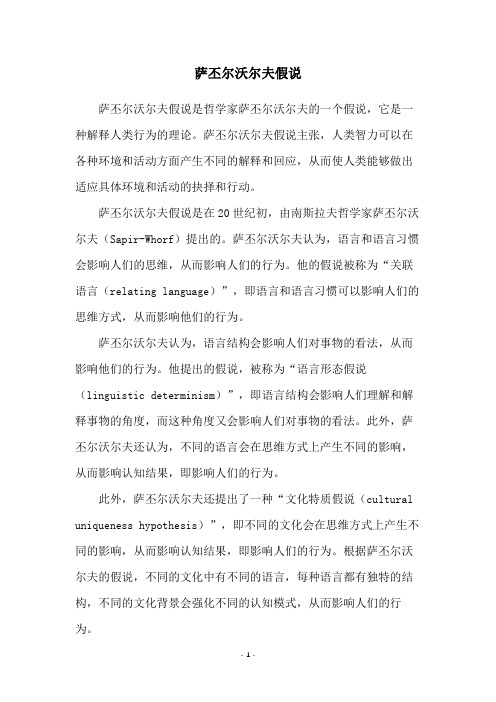
萨丕尔沃尔夫假说萨丕尔沃尔夫假说是哲学家萨丕尔沃尔夫的一个假说,它是一种解释人类行为的理论。
萨丕尔沃尔夫假说主张,人类智力可以在各种环境和活动方面产生不同的解释和回应,从而使人类能够做出适应具体环境和活动的抉择和行动。
萨丕尔沃尔夫假说是在20世纪初,由南斯拉夫哲学家萨丕尔沃尔夫(Sapir-Whorf)提出的。
萨丕尔沃尔夫认为,语言和语言习惯会影响人们的思维,从而影响人们的行为。
他的假说被称为“关联语言(relating language)”,即语言和语言习惯可以影响人们的思维方式,从而影响他们的行为。
萨丕尔沃尔夫认为,语言结构会影响人们对事物的看法,从而影响他们的行为。
他提出的假说,被称为“语言形态假说(linguistic determinism)”,即语言结构会影响人们理解和解释事物的角度,而这种角度又会影响人们对事物的看法。
此外,萨丕尔沃尔夫还认为,不同的语言会在思维方式上产生不同的影响,从而影响认知结果,即影响人们的行为。
此外,萨丕尔沃尔夫还提出了一种“文化特质假说(cultural uniqueness hypothesis)”,即不同的文化会在思维方式上产生不同的影响,从而影响认知结果,即影响人们的行为。
根据萨丕尔沃尔夫的假说,不同的文化中有不同的语言,每种语言都有独特的结构,不同的文化背景会强化不同的认知模式,从而影响人们的行为。
萨丕尔沃尔夫假说认为,语言和语言习惯能够影响人们的思维和行为,从而使人们能够在某种特定的语言环境中产生不同的解释和回应,从而使人们能够做出适应环境和活动的抉择和行动。
这一论点对人类行为的解释有着重要意义,它表明,人类行为是由语言习得、社会学习和文化背景所决定的。
在社会发展的过程中,萨丕尔沃尔夫假说受到了广泛的关注,被认为是一个重要的理论。
此外,萨丕尔沃尔夫假说也被认为在语言学和文化学研究中都具有重要意义,可以帮助我们了解不同文化背景下的思维方式和行为方式。
浅析“萨丕尔—沃尔夫假说”

浅析“萨丕尔—沃尔夫假说”作者:曾玉函来源:《南北桥》2017年第09期【摘要】萨丕尔—沃尔夫假说自问世以来就备受争议。
关于假说的最有效结论还没有被证明,本文从萨丕尔—沃尔夫假说的起源、发展等方面对假说进行了扼要的分析和评述。
【关键词】萨丕尔—沃尔夫假说语言思维语言相对论中图分类号:G4 文献标识码:A DOI:10.3969/j.issn.1672-0407.2017.09.045萨丕尔、沃尔夫自身也不是十分清楚是否完全接受了假说,因为他们谁也没有给出假说的定义。
他们还不时地改变有关观点。
斯坦伯格引用其他研究者的数据说明普通人和聋人智力没有区别。
他的关于没有语言的聋人也能思维的论据,也反驳了沃尔夫假说。
哈根有关语言相对论的实验显示会说两种语言的双语者在说话时可以随意从一种语言改说另一种语言,这只不过是进行语言转换,而不是改变思维方式。
人们从许多角度试图来证明、修改或反对沃尔夫假说,但迄今为止还没有得出令人信服的结论。
一、引言“萨丕尔—沃尔夫假说”(Sapir-Whorf Hypothesis,简称“假说”),又称语言相对论,是从人类语言的多样性出发,探究语言和思维、文化之间关系的理论。
这一理论认为不同的语言以不同的方式划分自然与确定范畴,即一种语言的结构会影响他们的思维模式。
二、萨丕尔—沃尔夫假说萨丕尔在1929年发表的论文中说:“语言强烈地制约着我们对各种社会问题和社会变化的一切思索。
人类并非孤立地生活在客观世界之中,也不是孤立地生活在人们通常所理解的那种社会活动范围之中,而是深受那充当社会表达工具的特定语言的支配……事实是‘现实世界’在很大程度上是不自觉地建立在人类社团的语言习惯之上的。
没有两种语言会相似到能将它们看成是代表同一社会现实。
不同社会所处的世界乃是不同的世界,而不是具有不同标志的同一世界。
”[1]不同的语言形式形成不同的言语社团的认知系统和意识背景,不同的系统和背景使各言语社团的世界观呈现出相对性。
萨丕尔—沃尔夫假说评析.

萨丕尔—沃尔夫假说评析摘要:萨丕尔—沃尔夫假说是语言学领域的重要学说之一,也是研究语言与文化关系的重要课题。
从语言发展及文化交流角度考察,该假说虽有其历史局限性,但在跨文化交际语境下仍有其积极现实意义。
关键词:萨丕尔—沃尔夫假说;语言;文化;跨文化交际Abstract: Sapir-Whorf hypothesis is one of the most important theories in linguistics, which is a significant issue in the study of relationship between language and culture. Examining from the aspect of culture and language itself, such hypothesis unavoidably has some limits because none theories are perfect. However, in the trend of intercultural communication nowadays, it plays a positive role in the further study of language.Key words: Sapir-Whorf hypothesis; language; culture;intercultural communication中图分类号:H00 文献标识码:A文章编号:1672-1578(2010)11-0001-011、引言语言理论研究中,围绕着语言与思维、文化等的关系问题出现过众多的学说理论,只有正确解决该问题才能树立正确的语言观。
而正确的语言观则是指导科学语言研究的基础和前提。
在历史上尤其是近代,诸多语言学家都曾对思维与语言的关系进行过深入研究。
其中,在18 世纪,一些哲学家和语言学家对人类众多不同的语言及其意义发生兴趣。
从萨丕尔—沃尔夫假说看语言对思维和文化的影响

四、结论
通过对政策补丁的类型与成因进行多案例的分析,可以发现政策补丁在不同 领域中的类型和成因具有一定的共性和差异。共性方面,政策补丁都是为了适应 外部环境的变化、弥补原有政策的不足、利用新技术新方法等而采取的措施;差 异方面,不同领域中的政策补丁在具体内容和形式上可能存在差异。因此,在制 定和实施政策补丁时,需要充分考虑不同领域的特点和需求,以确保政策补丁的 有效性和可操作性。
萨丕尔-沃尔夫假说(Sapir-Whorf Hypothesis)是语言学和认知科学中的 一个重要概念,它提出了语言决定或影响了人们对于世界的看法和认知。这个假 说有两方面的表述:
1、语言决定论(Linguistic Determinism):语言的结构决定了人们对于 世界的认知方式,因为语言将人们对于世界的经验分类并结构化,所以人们的思 维方式也受到了限制。
参考内容
一、引言
萨丕尔-沃尔夫假说(Sapir-Whorf Hypothesis)是语言学和认知科学中的 一个经典理论,该理论主张语言塑造了人类的思维方式。这个假说有两方面,强 式假说认为语言决定思维方式,而弱式假说则认为语言影响思维方式。本次演示 将从语言与思维的角度重新审视这一假说。
二、萨丕尔-沃尔夫假说的起源和 主要观点
一、政策补丁的类型
根据政策补丁的性质和目的,可以将政策补丁分为以下几种类型:
1、补充型补丁:这类政策补丁是对原有政策进行补充和完善的措施,旨在 弥补原有政策的不足,加强政策的实施效果。例如,针对原有税收政策的漏洞和 不足,政府发布新的补丁政策,完善税收征管体系,提高税收质量和效益。
2、修改型补丁:这类政策补丁是对原有政策中不适应新形势、新需求或存 在问题的条款进行修改和调整的措施。例如,针对原有环境保护政策中存在的缺 陷和不足,政府发布新的补丁政策,加强环境保护力度,促进可持续发展。
《跨文化交际学概论》课后习题答案

第一讲跨文化交际1。
在你的日常活动中哪些是比较典型的跨文化交际?答:(1)具有不同文化背景的人从事交际的过程就是跨文化交际。
(2)日常活动中比较典型的跨文化交际有:①中外领导人谈判、进出口公司的工作人员与外国商人谈生意;②和外国旅游者、外国留学生、外国教师交往;③阅读外国小说、观看外国电影、电视节目。
2. 你认为强调个人之间的文化差异有什么利弊?答:强调个人之间的文化差异有如下利弊:(1)利:每个人都隶属于若干群体,而且没有哪两个人隶属的群体是完全相同的。
即使在同一群体中,每个人的态度、价值和信念也不会完全一样。
因此,每个人都应该被认为是独特的.强调个人的差异,就是在从地区、职业、年龄、性别等方面来研究不同文化对个体的影响,这有助于跨文化交际深入开展. (2)弊:过于强调个人之间的文化差异也有一定的弊端.个体只是一种或多种文化的具体情况.根据传统的观念,文化通常不是指个人行为,而是指一个群体的生活方式和习惯,个人之间的差异研究只有在把他们当作群体代表时才有意义。
过于强调个人文化之间的差异会使跨文化交际变得非常繁琐,实际上取消了跨文化研究的意义。
3。
我国的地区文化差异是否可以作为跨文化交际研究的重要方面?答:我国的地区文化差异可以作为跨文化交际研究的重要方面。
(1)跨文化交际研究的重要性排序如下:主流文化—亚文化—地区文化—小群体文化。
(2)地区文化的差异是跨文化交际研究的重要课题之一.我国幅员辽阔、地域广袤,地势高低起伏,地形复杂多变,由于空间分布差异,各地区形成了具有各自地方特斯的区域文化.(3)同时,我国是一个多民族国家,每个民族都有自己的民族文化传统,这些也构成了地区文化的一部分。
这些地区文化从总体上看,特点显著,区别性强,差异性大,值得进行跨文化研究。
第二讲跨文化交际学1.跨文化交际学为什么产生在美国?答:跨文化交际学产生在美国有以下几个原因:(1)美国是一个移民国家。
除了印第安人以外,其他人都先后来自其他国家和地区.美国有来自欧洲、非洲、亚洲、拉丁美洲、大洋洲各国的移民.他们具有各自的文化传统和风俗习惯,他们在相互交际中难免产生问题,在年上世纪60年代,少数民族特别是黑人争取自己权利与地位的斗争风起云涌,民族意识日益增强,各少数民族都强调维护自己的文化,于是逐渐地在美国社会形成了多元文化的格局。
试论“萨丕尔—沃尔夫假说”视角下的语言与思维关系

试论“萨丕尔—沃尔夫假说”视角下的语言与思维关系一、本文概述语言是人类社会中不可或缺的交流工具,它承载着文化传承、思想表达和社会交际等多重功能。
而思维,作为人类认识世界、理解事物、解决问题的内在过程,同样对语言的发展和应用产生深远影响。
在语言学与心理学的研究领域中,语言与思维之间的关系一直是一个备受关注的话题。
本文旨在从“萨丕尔—沃尔夫假说”的视角出发,探讨语言与思维之间的相互作用和影响,分析该假说对理解人类语言和思维关系的启示,并通过对该假说的深入解读,进一步理解语言和思维之间的复杂关系。
“萨丕尔—沃尔夫假说”是一种关于语言与思维之间关系的理论,它认为语言不仅仅是一种表达思想的工具,更是一种塑造和影响思维方式的力量。
该假说认为,语言的结构和用法会影响人们对世界的认知和理解,进而影响人们的思维方式和行为模式。
本文将从该假说的核心观点出发,探讨语言与思维之间的相互关系,分析不同语言对人们思维方式的影响,以及这种影响如何体现在人们的日常生活和社会行为中。
本文还将对“萨丕尔—沃尔夫假说”的争议和批评进行讨论,探讨该假说的合理性和局限性,以及它在解释语言与思维关系时的适用性和限制。
通过对该假说的全面分析和评价,本文旨在提供一个更为深入和全面的理解语言与思维关系的视角,为相关领域的研究提供新的思路和方法。
二、萨丕尔—沃尔夫假说的基本内容萨丕尔-沃尔夫假说,又被称为语言相对论或语言决定论,是语言学中的一个重要理论。
该假说由美国语言学家爱德华·萨丕尔(Edward Sapir)及其学生本杰明·沃尔夫(Benjamin Lee Whorf)提出,并在他们的著作中得到了深入的阐述。
萨丕尔-沃尔夫假说主要包含两个方面的内容:语言塑造思维,以及语言决定文化。
关于语言塑造思维。
萨丕尔和沃尔夫认为,语言不仅仅是交流的工具,它更是一种思维方式,一种认知世界的框架。
不同的语言有不同的语法结构、词汇和表达方式,这些都会影响人们对世界的认知和理解。
萨丕尔一沃尔夫假说(1)

萨丕尔—沃尔夫假说的现代研究*名:**指导教师:**院系:文学院专业: 09对外汉语提交日期: 2012年6月30日目录中文摘要 (2)外文摘要 (3)引言 (4)一、萨丕尔一沃尔夫假说产生的原因及其内容 (4)二、萨丕尔一沃尔夫假说的影响 (5)三、萨丕尔一沃尔夫假说的现代研究一反正语言与思维的关系 (6)(一)萨丕尔一沃尔夫假说的本质是语言和思维的关系 (6)(二)萨丕尔一沃尔夫假说的反证 (6)(三)语言与思维在社会中的地位 (7)四、研究萨丕尔一沃尔夫假说的意义 (7)(一)学术价值 (7)(二)现实意义 (8)注释 (8)参考文献 (8)致谢 (8)萨丕尔一沃尔夫假说的现代研究指导老师:唐宁(黄山学院文学院,安徽,黄山,245041)摘要:通过对萨丕尔—沃尔夫假说的产生,核心内容及其产生的影响的介绍,引出论文的中心,即利用萨丕尔—沃尔夫假说来反证语言与思维的关系,提出自己的见解:思维对语言具有同样的反作用,并且初探研究的意义所在。
关键词:萨丕尔一沃尔夫假说;语言相对论;语言绝对论;反证语言与思维的关系;现代研究的意义。
The Modern Study OfThe Sapir-Whorf HypothesisDirector: TangNing(School of Liberal Arts, Huangshan University, Huangshan, Anhui, 245041)Abstract:In order to introduce the main idea of the paper which is to demenstrate the relationship between language and thinking by use of the Sapir—Whorf Hypothesis,I have made a short introduction of the Sapir-Whorf Hypothesis's origination,main idea and the influence which it has brought about. And then I put up with my own opinion—thinking does make the same effect on the language as language does.Key Words:language and thinkping;the Sapir-Whorf Hypothesis; linguistic relativity; linguistic determinism; to demenstrate the relatietween language and thinking;onship bthe significance of moden study.引言“萨丕尔—沃尔夫”假说的核心是人的语言影响了人对现实的感知。
萨丕尔-沃尔夫假说
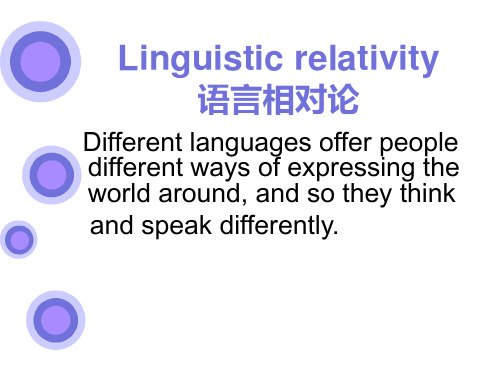
齐天大圣
When looking at this word, we will think about the famoud monkey.
What will the westerners think about?
the Great Sage Equalling Heaven
people trend to sort out and distinguish experiences differently accordingly to the semantic categories provided by their different codes in their culture
Linguistic relativity
语言相对论
Different languages offer people different ways of expressing the world around, and so they think
and speak differently.
Sapir-Whorf Hypothesis
In English-speaking cultures, snow is far less importment and the simple word snow usuallt suffices the need. When some needs become more specific, however, longer phrasescan be made up to meet these needs:
they believe that languages filters people's perception and the way they categorize their experiences.
萨丕尔沃尔夫假设

萨丕尔沃尔夫假设萨丕尔沃尔夫假设(Sapir-WhorfHypothesis)是一种可以跨越文化界限的重要理论,指出语言会影响人们思考和观察世界的方式。
它是由美国语言学家萨丕尔(Edward Sapir)和德前语言学家沃尔夫(Benjamin Whorf)联合提出的。
他们认为,人们受语言、文化和历史环境的影响而形成了一种特定的思维模式,通过使用特定的语言,形成了一种特定的认识体系,这一体系对人们的思维习惯,认知模式和对外部事物的理解有着深远的影响。
一般来讲,人们的语言表达能力不断完善,从而加深了他们对内容的理解,以及形成了一种独特的认知观念和行为模式。
语言的影响力表现在不同的层面。
它可以以系统的形式影响人们的语言表达,从而影响人们对事物的认识,思维模式以及对外部事物的理解能力。
Sapir-Whorf Hypothesis指出,一种语言只能提供相对独特的、有限的可用词汇,因此最终影响着一种文化的思维框架和认知模式。
比如,语言中的某些不可或缺的概念可能在另一种语言中不存在,而在另一种语言中可能有一个新的概念。
在这种情况下,每种语言都可能为人们提供一种可以理解和表达外部事物的独特语言概念,从而建立一种新的观念体系。
Sapir-Whorf Hypothesis被广泛应用于语言学研究和文化研究中。
事实上,萨丕尔沃尔夫假设在跨文化传播研究中有着重要的意义。
Sapir-Whorf Hypothesis强调,文化和语言是一个互相联系的整体,而且文化可以通过语言得到表达。
因此,当我们分析不同文化之间的差异时,我们必须考虑他们所使用的语言,以及这门语言如何影响他们对这个文化的看法。
Sapir-Whorf Hypothesis也被用于分析新一代的语言习惯与认知理论。
我们可以观察某个社会的语言习惯如何随着新一代的出现而不断演变,以及新一代的语言如何影响他们对外部事物的看法。
根据Sapir-Whorf Hypothesis,语言可以改变人们的思维模式,从而改变人们的认知观念和行为模式。
sapir-whorf hypothesis

The Sapir-Whorf hypothesis萨丕尔-沃尔夫假设主要内容The Am erican anthropologist-linguist Edward Sapir and his student Benjamin Lee Whorf proposed a sweeping, two-pronged hypothesis concerning language and thought.美国人萨丕尔及其弟子沃尔夫提出的有关语言与思维关系的假设是这个领域里至今为止最具争议的理论。
Whorf proposed first that all higher levels of thinking are dependent on language. Or put it more bluntly, language determines thought, hence the strong notion of linguistic determinism. Because languages differ in many ways, Whorf also believed that speakers of different languages perceive and experience the world differently, that is, relative to their linguis tic background, hence the notion of linguis tic relativism.沃尔夫首先提出,所有高层次的思维都倚赖于语言。
说得更明白一些,就是语言决定思维,这就是语言决定论这一强假设。
由于语言在很多方面都有不同,沃尔夫还认为,使用不同语言的人对世界的感受和体验也不同,也就是说与他们的语言背景有关,这就是语言相对论。
If follows from this strong version of the hypothesis that there is no real translation and that it is impossible to learn the language of a different culture unless the learner abandons his or here own mode of thinking and acquires the thought patterns of the native speakers of the target language.由萨丕尔-沃尔夫假设的这种强假设可以得出这样的结论:根本没有真正的翻译,学习者也不可能学会另一种文化区的语言,除非他抛弃了他自己的思维模式,并习得说目的语的本族语者的思维模式。
The Sapir-Whorf Hypothesis

The Sapir-Whorf hypothesis 萨丕尔-沃尔夫假设The American anthropologist-linguist Edward Sapir and his student Benjamin Lee Whorf proposed a sweeping, two-pronged hypothesis concerning language and thought.美国人萨丕尔及其弟子沃尔夫提出的有关语言与思维关系的假设是这个领域里至今为止最具争议的理论。
Whorf proposed first that all higher levels of thinking are dependent on language. Or put it more bluntly, language determines thought, hence the strong notion of linguistic determinism. Because languages differ in many ways, Whorf also believed that speakers of different languages perceive and experience the world differently, that is, relative to their linguistic background, hence the notion of linguistic relativism.沃尔夫首先提出,所有高层次的思维都倚赖于语言。
说得更明白一些,就是语言决定思维,这就是语言决定论这一强假设。
由于语言在很多方面都有不同,沃尔夫还认为,使用不同语言的人对世界的感受和体验也不同,也就是说与他们的语言背景有关,这就是语言相对论。
If follows from this strong version of the hypothesis that there is no real translation and that it is impossible to learn the language of a different culture unless the learner abandons his or here own mode of thinking and acquires the thought patterns of the native speakers of the target language.由萨丕尔-沃尔夫假设的这种强假设可以得出这样的结论:根本没有真正的翻译,学习者也不可能学会另一种文化区的语言,除非他抛弃了他自己的思维模式,并习得说目的语的本族语者的思维模式。
论萨丕尔-沃尔夫假说
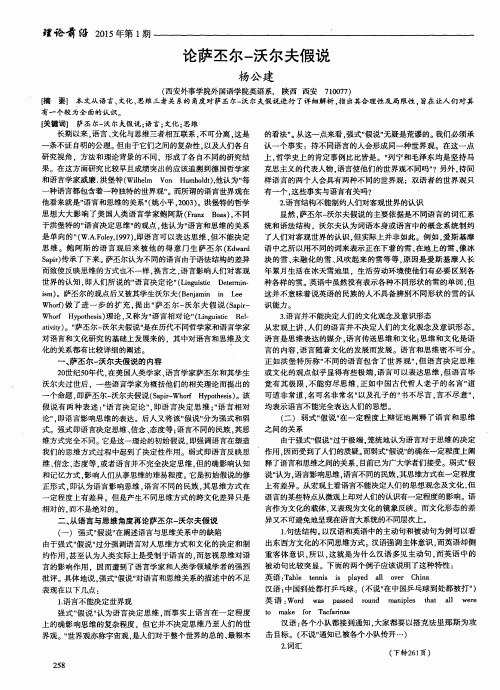
块 的雪 、 未融 化的雪 、 风吹起来 的雪等等 , 原 因是 爱斯基摩 人长 种各样的雪。英语 中虽然没有表示各种不同形状 的雪的单词 , 但
S a p i r ) 传承 了下来 。 萨丕尔认为不 同的语 言由于语法结构的差异 世界的认 知 , 即人们所说 的” 语言决定论 ” ( L i n g u i s t i c D e t e r mi n -
i s m) 。萨丕尔的观点后又被其学生沃尔夫( B e n j a m i n i n L e e
条不证 自明的公 理。 但 由于它们之 间的复杂性 . 以及人们各 自
果。在这方 面研究 比较早且成绩突 出的应 该追溯到德 国哲学家 和语言学家威廉 . 洪堡特 ( Wi l h e l m Y o n H u m b o l d t ) , 他认为” 每
一
研究视角 ,方法 和理论背景的不同 ,形成 了各 自不 同的研究结
种语言都包含着一种独特 的世界观 ” 。而所谓 的语言世界观在
他 看来就是” 语言和思维的关系” ( 姚小平 , 2 0 0 3 ) 。洪堡特 的哲学
思想大大影 响了美 国人类语 言学家鲍阿斯 F r a n z B o a s ) . 不同 于洪堡 特的” 语言决定思维” 的观点 。 他 认为” 语言和思维 的关 系 是单 向的” ( w. A . F o l e y , 1 9 9 7 ) , 即语言可 以表达思维 , 但不能决定
假说 有两种 表述 : ” 语 言决定论 ” , 即语言 决定思 维 ; ” 语 言相对 均表示语言不能完全表达人们 的思想 。 ( 二) 弱式” 假说 ” 在一定程度上 辩证地 阐释 了语 言和 思维 论” 。 即语言影 响思维 的表达 。后人又将该 ” 假说” 分为强式 和弱
萨丕尔沃尔夫假说

XXXXX
XXXXX
XXXXXX
其次,萨丕尔—沃尔夫假说也强调了跨文化交流的重要性。当我们学习其他语言时,我们不仅可以获得新的交流工具,还可以接触到其他文化、历史和世界观。这种跨文化的理解可以扩大我们的视野,增强我们的文化敏感度,有助于我们这个假说也影响着我们对待语言变异和语言接触的态度。语言变异是语言发展的自然现象,而语言接触则是在全球化背景下更是不可避免的。我们应更积极地对待这些问题,将它们视为语言生命力和文化丰富性的体现。在教育过程中,我们应帮助学生理解和适应这些变化,培养他们的语言适应能力和文化包容心
萨丕尔—沃尔夫假说
萨丕尔—沃尔夫假说
目录
1
萨丕尔—沃尔夫假说
2
是语言学和人类学中的一个重要理论,由语言学家爱德华·萨丕尔和他的学生本尼迪克特·沃尔夫在20世纪早期提出。这个假说的主要观点是,语言不仅是交流工具,而且反映了文化、历史和世界观。这个假说认为,语言塑造了我们对世界的理解,语言的结构和词汇选择反映了文化、社会和心理特征
除了以上提到的方面,萨丕尔—沃尔夫假说还启发了我们对语言政策与规划、语言与认知关系的新思考
首先,萨丕尔—沃尔夫假说提醒我们,语言使用和语言政策会影响人们的认知和思维方式。语言是人们思考和表达思想的主要工具,不同的语言使用和政策会导致不同的认知和思维方式。例如,某些语言强调主语和宾语之间的互动关系,这可能会影响使用该语言的人的互动方式和思维方式。因此,我们在制定语言政策和规划时,应考虑其对人们认知和思维方式的影响
此外,萨丕尔—沃尔夫假说还认为,语言与认知密切相关。我们的思维方式和世界观在很大程度上受到我们使用的语言的影响。语言的词汇选择、语法结构和发音方式都会影响我们对世界的理解和解释。例如,某些语言的语法结构强调主语和宾语之间的互动关系,这可能影响使用该语言的人的思维方式,使其更加强调互动和关系的重要性
胡壮麟《语言学教程》笔记和考研真题及典型题详解(7-12章)【圣才出品】

1 / 147
圣才电子书 十万种考研考证电子书、题库视频学习平台
different languages may probably express their unique ways of understanding the world. Following his argument, two important points could be captured in this theory. On the one hand, language may determine our thinking patterns; on the other, similarity between languages is relative. For two different speech communities, the greater their structural differentiations are, the more diverse their conceptualization of the world will be. For this reason, this hypothesis has alternatively been referred to as linguistic determinism and linguistic relativity. 【考点:名词解释;指出该假说的两种版本】
②To help the students transcend their own culture and see things as the members of the
_萨丕尔_沃尔夫假说_解析
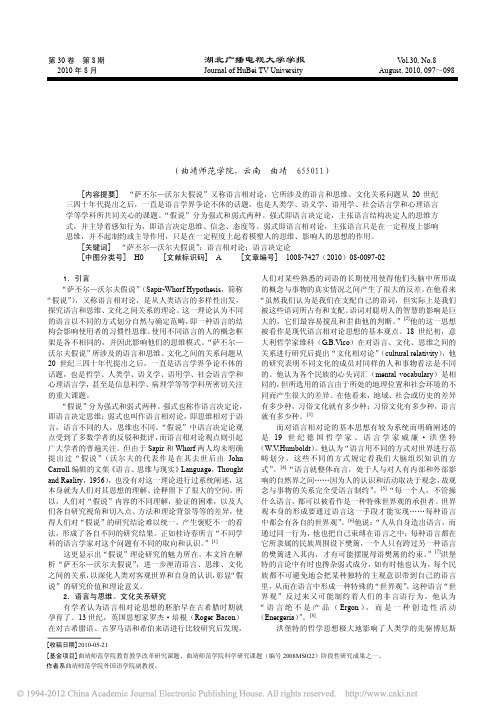
第30卷第8期湖北广播电视大学学报V ol.30, No.8 2010年8月 Journal of HuBei TV University August. 2010, 097~098 “萨丕尔—沃尔夫假说”解析莫 琼(曲靖师范学院,云南 曲靖 655011)[内容提要]“萨丕尔—沃尔夫假说”又称语言相对论,它所涉及的语言和思维、文化关系问题从20世纪三四十年代提出之后,一直是语言学界争论不休的话题,也是人类学、语义学、语用学、社会语言学和心理语言学等学科所共同关心的课题。
“假说”分为强式和弱式两种。
强式即语言决定论,主张语言结构决定人的思维方式,并主导着感知行为,即语言决定思维、信念、态度等。
弱式即语言相对论,主张语言只是在一定程度上影响思维,并不起制约或主导作用,只是在一定程度上起着模塑人的思维、影响人的思想的作用。
[关键词] “萨丕尔—沃尔夫假说”;语言相对论;语言决定论[中图分类号] H0 [文献标识码] A [文章编号] 1008-7427(2010)08-0097-021.引言“萨丕尔—沃尔夫假说”(Sapir-Whorf Hypothesis,简称“假说”),又称语言相对论,是从人类语言的多样性出发,探究语言和思维、文化之间关系的理论。
这一理论认为不同的语言以不同的方式划分自然与确定范畴,即一种语言的结构会影响使用者的习惯性思维。
使用不同语言的人的概念框架是各不相同的,并因此影响他们的思维模式。
“萨丕尔—沃尔夫假说”所涉及的语言和思维、文化之间的关系问题从20世纪三四十年代提出之后,一直是语言学界争论不休的话题,也是哲学、人类学、语义学、语用学、社会语言学和心理语言学,甚至是信息科学、病理学等等学科所密切关注的重大课题。
“假说”分为强式和弱式两种。
强式也称作语言决定论,即语言决定思维;弱式也叫作语言相对论,即思维相对于语言,语言不同的人,思维也不同。
“假说”中语言决定论观点受到了多数学者的反驳和批评,而语言相对论观点则引起广大学者的普遍关注。
SapirWorfHypothesis萨皮尔沃尔夫假说
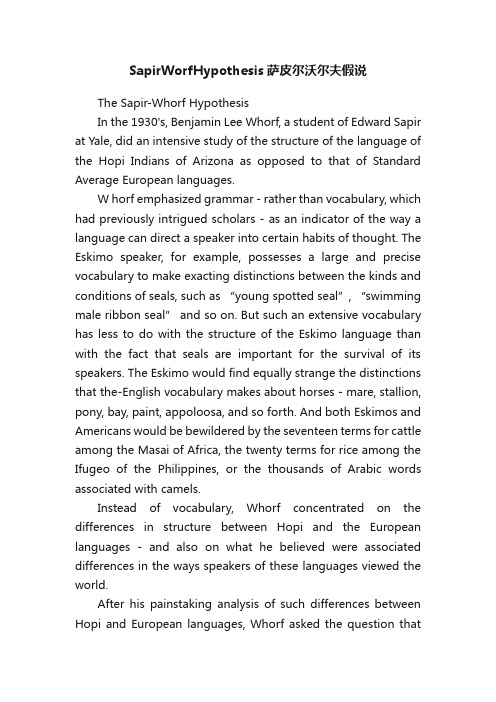
SapirWorfHypothesis萨皮尔沃尔夫假说The Sapir-Whorf HypothesisIn the 1930's, Benjamin Lee Whorf, a student of Edward Sapir at Yale, did an intensive study of the structure of the language of the Hopi Indians of Arizona as opposed to that of Standard Average European languages.W horf emphasized grammar - rather than vocabulary, which had previously intrigued scholars - as an indicator of the way a language can direct a speaker into certain habits of thought. The Eskimo speaker, for example, possesses a large and precise vocabulary to make exacting distinctions between the kinds and conditions of seals, such as “young spotted seal”, “swimming male ribbon seal” and so on. But such an extensive vo cabulary has less to do with the structure of the Eskimo language than with the fact that seals are important for the survival of its speakers. The Eskimo would find equally strange the distinctions that the-English vocabulary makes about horses - mare, stallion, pony, bay, paint, appoloosa, and so forth. And both Eskimos and Americans would be bewildered by the seventeen terms for cattle among the Masai of Africa, the twenty terms for rice among the Ifugeo of the Philippines, or the thousands of Arabic words associated with camels.Instead of vocabulary, Whorf concentrated on the differences in structure between Hopi and the European languages - and also on what he believed were associated differences in the ways speakers of these languages viewed the world.After his painstaking analysis of such differences between Hopi and European languages, Whorf asked the question thatwas central to his research. Do the Hopi and European cultures confirm the fact that their languages conceptualize reality in different ways? And his answer was that they do. Whereas European cultures are organized in terms of space and time, the Hopi culture, Whorf believed, emphasizes events. To speakers of European languages, time is a commodity that occurs between fixed pointy and can be measured. Time is said to be wasted or saved; an army fighting a rear-guard action tires to buy time; a television station sells time to an advertiser. People in the European tradition keep diaries, records, accounts, and histories; their economic systems emphasize wages paid for the amount of time worked, rent for the time a dwelling is occupied, interest for the time money is loaned.Hopi culture has none of these beliefs about time, but instead thinks of it in terms of events. Plant a seed - and it will grow. The span of time the growing takes is not the important thing, but rather the way in which the event of growth follows the event of planting. The Hopi is concerned that the sequence of events in the construction of a building be in the correct order, not that it takes a certain amount of time to complete the job. That is why the building of a Hopi house, adobe brick by adobe brick, may go on for years. Whorf s comparison of Hopi and E u r o p e a n l a n g u a g e s a n d c u l t u r e s - considerably more involved than the summary I have presented - convinced him that the contrasting world views of their speakers resulted from contrasts in their languages. He concluded that, linguistically speaking, no human being is born free; his mind was made up for him from the day he was born by the language of his speech community. Whorf questioned peoples' ability to be objective, and he threw into doubt the rationality of everyday utterances.lie suggested that all their lives English speakers have been tricked by their languages into thinking along certain channels - and it is small consolation to know that the Hopi has also been tricked, but in a different way.Whorf's theories about the relationship between culture and language have been greeted enthusiastically by some scholars and attacked or treated warily by others. The weakness of the Sapir-Whorf Hypothesis, as it has come to be known, is the impossibility of generalizing about entire cultures and then attributing these generalizations to the languages spoken. The absence of clocks, calendars, and written histories obviously gave the Hopis a different view of time than that found among speakers of European languages. But such an observation is not the same thing as proving that these cultural differences were caused by the differences between Hopi and European grammars. In fact, an interest in time-reckoning is not characteristic solely of European cultures but can be found among speakers of languages as different as Egyptian, Chinese and Maya. And, on the other hand,thousands of unrelated speech communities share with the Hopis a lack of concern about keeping track of time. To attempt to explain cultural differences and similarities as a significant result of the languages spoken is to leave numerous facts about culture unexplained. The great religions of the world - Judaism, Christianity, Hinduism, and Islam - have flourished among diverse people who speak languages with sharply different grammars. Islam, for example, has been accepted by speakers of languages with grammars as completely different as those of the Hamito-Semitic, Turkish, Indo-Iranian, Tibeto-Burman, and Malayo-Polynesian families. And the reverse is true as well. Cultures asdiverse as the Aztec Empire of Mexico and the Ute hunting bands of the Great Basin spoke very closely related tongues. Nevertheless, attempts have been made to prove the Sapir-Whorf Hypothesis, such as one experiment which used as test subjects bilingual Japanese women, living in San Francisco, who had married American servicemen. The women spoke English to their husbands, children, and neighbours, and in most everyday speech situations; they spoke Japanese, whenever they came together to gossip, reminisce, and discuss the' news from home. Each Japanese woman thus inhabited two language worlds - and according to the predictions of the hypothesis, the women should .. think differently in each of these worlds. The experiment consisted of two visits to each woman by a bilingual Japanese interviewer. During the first interview he chatted with them only in Japanese; during the second he carried on the same discussion and asked the same questions in English. The results were quite remarkable; they showed that the attitudes of each woman differed markedly, depending upon whether she spoke Japanese or English. Here, for example, is the way the same woman complete the same sentences at the two interviews:When my wishes conflict with my family's...it is a time of great unhappiness. [Japanese]I do what I want. [English]Real friends should...... help each other. [Japanese] ...be very frank. [English]Clearly, major variables in the experiment had been eliminated - since the women were interviewed twice by the same person in the same location of their homes, and the discussed the same topics - with but one exception. And that soleexception was language. The drastic differences in attitudes of the women could be accounted for only by the language world each inhibited when she spoke.Many linguists nowadays are aware of the Sapir Whorf Hypothesis. Attempts to confirm the hypothesis, such as the experiment with the Japanese women... are usually regarded as fascinating examples rather than as universal truths about the way speech communities view the world. Neither Whorf nor any of his followers has proven to everyone's satisfaction that differences between two speech communities in their capacity to understand external reality are based entirely or even overwhelmingly on differences in their languages. Whorf overemphasized one point (that languages differ in what can be said in them) at the expense of a greater truth (that they differ as to what is relatively easy to express in them). Languages, rather than causing cultural differences between speech communities, seem instead to reflect the different cultural concerns of their speakers. The history of language is not so much the story of people misled by their languages as it is the story of a successful struggle against the limitations built into all language systems... The true value of Whorf s theories is not the one he worked so painstakingly to demonstrate - that language tyrannizes speakers by forcing them to think in certain ways. Rather, his work emphasized something of even greater importance: the close alliance between language and the total culture of the speech community. No linguist today doubts that language and culture interpenetrate one another; nor does any linguist fail to pay due respect to Whorf for emphasizing this fact.[Peter Farb]。
跨文化交际第四章

鹰、孔雀、狗)
跨文化交际中的文化过滤
在交际中,我们对外来的文化符号——语言的诠释必然受到自 身文化的过滤。人们会自动对外来的符号加以界定,有时能够 界定准确,但是有时会受到自身文化的影响界定偏差。因此, 能否界定准确,取决于对对方文化的了解程度。
对“竹”的理解
中国对竹的理解不仅仅是一种植物,常常以竹喻人, 表达坚定、正直、高风亮节等意。如: •竹色君子德,猗猗寒更绿。 •常爱凌寒竹,坚贞可喻人。 •竹死不变节,花落有余香。
三、语用与文化
• 陌生人: Sir; Madam • 不熟悉的女性:Ms. +姓(不考虑年龄、结婚与否) • 西方中小学:Mr. +姓; Ms. +姓; • 大学里:Dr. +姓;Professor. +姓 • 西方称赞语高度格式化: • You are in good spirits today. • I like your scarf. • This is a beautiful house. • 回答感谢欧美是一致原则,中国人遵循谦虚原则。 • 拥挤、打嗝—Excuse me; Sorry • 在西方人看来,请+祈使句,是粗鲁的。
竹子并不长在英国,英语中的竹-bamboo是从其他语 言中借用过来的,在英语中没有任何联想意义,只是 作为一个单纯的植物的符号。
对“西风”的理解
由于中英两国位置的不同,当西风吹来的时候,中国 是深秋隆冬,树木凋零,所以西风在中文中带有消极 的意义,如: •昨夜西风凋碧树,独上高楼,望尽天涯路。 •古道西风瘦马,夕阳西下,断肠人在天涯。
- 1、下载文档前请自行甄别文档内容的完整性,平台不提供额外的编辑、内容补充、找答案等附加服务。
- 2、"仅部分预览"的文档,不可在线预览部分如存在完整性等问题,可反馈申请退款(可完整预览的文档不适用该条件!)。
- 3、如文档侵犯您的权益,请联系客服反馈,我们会尽快为您处理(人工客服工作时间:9:00-18:30)。
Sapir-Whorf hypothesis
萨丕尔-沃尔夫假说
1、The philosophical basis of the Sapir-Whorf Hypothesis is empirical and the theoretical background is structuralism、
萨丕尔与沃尔夫就是语言相对论思想的集大成者。
2、While we reject the strong version of the Sapir-Whorf hypothesis, its weaker version is generally accepted by most scholars、
尽管我们反对萨丕尔-沃尔夫假设的强假设,而大部分学者却普遍接受了其弱假设。
S a p i r-W h o r f h y p o t h e s i s
●E d w a r d S a p i r a n d B e n j a m i n W h o r f,p r o c l a i m e d t h a t t h e s t r u c t u r e o f t h e l a n g u a g e p e o p l e h a b i t u a l l y u s e i n f l u e n c e s t h e w a y s t h e y
t h i n k a n d b e h a v e,i、e、d i f f e r e n t l a n g u a g e s o f f e r p e o p l e d i f f e r e n t w a y s o f e x p r e s s i n g t h e w o r l d a r o u n d,t h e y t h i n k a n d s p e a k
d i f f
e r e n t l y,t h i s i s a l s o k n o w n a s l i n g u i s t i c r e l a t i v i t y、
●S a p i r a n d W h o r f b e l i e v e t h a t l a n g u a g e f i l t e r s p e o p l e’s p e r c e p t i o n
a n d t h e w a y t h e y c a t e g o r i z e e x p e r i e n c e s、T h i s i n t e r d e p e n d e n c e o f l a n g u a g e a n d t h o u g h t i s n o w k n o w n a s S a p i r-W h o r f
H y p o t h e s i s、
S t r o n g v e r s i o n&w e a k v e r s i o n
●S t r o n g v e r s i o n b e l i e v e s t h a t t h e l a n g u a g e p a t t e r n s d e t e r m i n e
p e o p l e’s t h i n k i n g a n d b e h a v i o r;
●W e a k v e r s i o n h o l d s t h a t t h e f o r m e r i n f l u e n c e t h e l a t t e r、
----T h e s t u d y o f t h e l i n g u i s t i c r e l a t i v i t y o r S W H h a s s h e d t w o
i m p o r t a n t i n s i g h t s:
●T h e r e i s n o w a d a y s a r e c o g n i t i o n t h a t l a n g u a g e,a s c o d e,r e f l e c t s
c u l t u r a l p r e o c c u p a t i o n s a n
d c o n s t r a i n s t h
e w a y p e o p l e t h i n k、
●M o r e t h a n i n W h o r f’s d a y s,h o w e v e r,w e r e c o g n i z e h o w
i m p o r t a n t c o n t e x t i s i n c o m p l e m e n t i n g t h e m e a n i n g s e n c o d e d i n t h e l a n g u a g e、
Much was made of the Inuit language where there is no precise equivalent to the single English word "snow、"
Because snow is such an important part of survival of people of the north, they had nineteen different words that varied according to the condition of snow、
At first, some argued that this was only a matter of what sizes and shapes of boxes are the words we use in which to put experiences、
In English, however, we have no single word meaning the chemical, di-hydrogen oxide (H2O)、
If you want to object and say, "But we have the word 'water,'" let me point out that the word "water" does not apply to conditions of H2O
when it is frozen, crystallized or vaporized, for which we have other words (ice, snow, steam, fog, clouds, humidity)、
From the time we are born, we are inundated with thousands of bits of information per second, as sound, smell, touch, temperature and sight、
They are many and random、In themselves, they have no meanings、
It is only through our interaction with other human beings that we begin to apply meaning, and we start to put a range of different information bits into the same categories, words、
Those words, or categories of large numbers of information bits, differ from language to language、。
